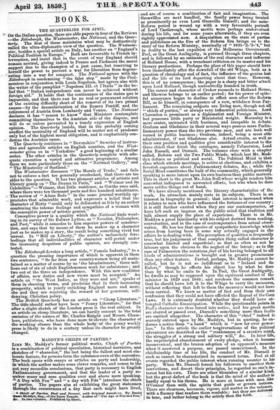BOOKS.
THE QUARTERLIES FOR APRIL.
ON the Italian question, there are able papers in four of the Reviews —the Edinburgh, the Westminster, the National, and the Quar- terly. The first of these maintains what may be distinctively called the ultra-diplomatic view of the question. The Westmin- ster, besides a special article on Italy, has another on "England's Political Position in Europe." Both are favourable to French in- tervention, and insist that in the event of war England should remain neutral, giving indeed to France and Piedmont the moral support due to the champion of a just cause, but reserving to herself the power to prevent a war for liberation from degene- rating into a war for conquest. The National agrees with the Edinburgh in condemning "the false step" made by the Pied- montese in conjunction with Louis Napoleon, but agrees also with the writer of the pamphlet " Napoleon Ill. et l'Italie " in the be- lief that " Italian independence can never be achieved without foreign aid." It holds that the continuance of the status quo is impossible, and that there can be no real or permanent solution of the existing difficulty short of the removal of its two primal causes—by the deseoularization of the Roman Pontiff, and the retirement of Austria from Lombardy and Venice. The National declares it has " reason to know " that Ministers contemplate committing themselves to the Austrian side of the dispute, and will do so unless prevented by a timely expression of English opinion. The Quarterly insists, that in the probably coming conflict the neutrality of England will be matter not of prudence only but of the highest moral obligation, and it emphatically con- demns the Austrian cause.
The Quarterly continues in " Devonshire" its series of instruc- tive and agreeable articles on English counties, and the West- minster gives us in " Yorkshire" a good beginning of a similar series. The other articles in the Quarterly complete with ade- quate execution a varied and attractive programme. Among them we note particularly those on the "National Gallery," and " The Minstrelsy of Scotland." The Westminster discusses "The Morals of Trade," and fails not to enforce a fact too generally overlooked, that there are too sides to the question. It has two pleasant articles of artistic and literary gossip on " The Drama in Paris," and " Weimar and its Celebrities "—Weimar, that little residence, as Goethe once said, where there were ten thousand poets and five hundred inhabitants. The review of " Adam Bede " in the same journal worthily tip- - predates that admirable work, and expresses a belief that the character of Hefty "could only be delineated as it is by an author combining the intense feelings and sympathies of a woman with the conoeptivb power of artistic genius." Conceptive power is a quality which the National finds want- ing in its survey of Sir Bulwer Lytton, as " Novelist, Philosopher, and Poet," while it concedes to him superior powers of construc- tion, and says that by means of them he makes up a character just as he makes up a story, the result being something vivid but unreal. In " Mill on Liberty," the author's melancholy fore- bodings that all individualities of character will perish under the increasing despotism of public opinion, are strongly con- tested.
The Edinburgh devotes a long artiole, " Female Industry," to a question the pressing importance of which is apparent in these two sentences, " So far from our countrywomen being all main- tained as a matter of course by us the breadwinners,' three- mil- lions out of six of adult Englishwomen work for subsistence ; and two out of the three an independence. With this new condition of affairs, new duties and new views must be accepted." An article on " the West Indies, as they were and are," speaks of them in cheering terms, and proclaims that in their increasing prosperity, which is yearly enriching England more and more, she and they are receiving the reward of her generous, self- denying, Christian policy. The British Quarterly has an article on " Cheap Literature." The title- should rather have been " Penny Literature," for that after a slight sketch of the London press is the real subject. In an article on cheap literature, we can hardly consent to the total omission of the names of Mr. Charles Knight and Messrs. Cham- bers, publishers, who have done more to elevate the character of the working classes than the whole body. of the penny weekly press is likely to do in a century unless its character be greatly changed.


























 Previous page
Previous page